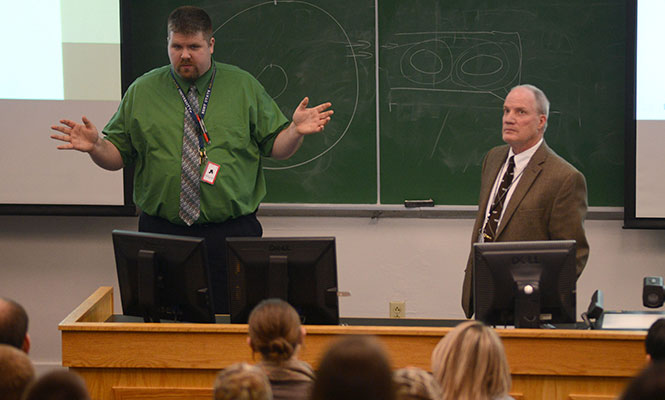FAA changes hiring requirements for new grads
(From left) Assistant air traffic control professor Jason Boergerhoff and assistant flight and air traffic control professor Robert Priestley speak to students of the Kent State aeronautics program about the recent changes made by the Federal Aviation Administration to the air traffic control hiring process, in Van Deusen Hall, Thursday, Jan. 23, 2014. The new process will no longer take applicants’ job location preference into account when hiring, announced Jan. 10, 2014.
January 23, 2014
The Federal Aviation Administration recently announced its new hiring process for air traffic controllers, a decision that affects 36 Collegiate Training Initiative schools, including Kent State.
A newsletter from the FAA was sent to CTI schools, which teach students the basics of air traffic control, in December. The newsletter said graduates would no longer be put on a waiting list that guaranteed them a job in their desired field. Under the new guidelines, they now have to compete with people who have work experience instead of a degree, forcing graduates who have already applied to work for the FAA to reapply to be considered for a position.
Associate professor of aeronautics Robert Priestley said that the news leaves students with many unanswered questions.
“The students are now in competition with everyone, which leaves them asking, ‘What about me?’ ” Priestly said.
Sophomore air traffic control major Christina Markulin only knows what the policy means because of emails from academic advisers.
“From what I know about the hiring rules, I need to stay on top of my game,” Markulin said. “The FAA is really strict about a lot of things now.”
Assistant air traffic control professor Jason Boergerhoff said the policy now means that graduates no longer have a choice of where they want to work.
“Before, you could pick where you wanted to work. In the past, if you wanted to work in Ohio or Indiana, you would only choose from openings there,” Boergerhoff said. “Now, you take a job wherever there is an opening.”
Priestly said the change in hiring is similar to what he dealt with when he started his career in air traffic control.
“The FAA changes its policies a lot throughout the years,” Priestly said. “What we are going through is pretty similar to what I had to do 30 years ago.”
As the severity of the FAA’s changes continues to unfold, Boergerhoff is prepared to take action if the policy affects current students in a negative way.
“I am cautiously optimistic about this change,” Boergerhoff said. “If this is bad for the students, I can’t say much, but I am planning to speak to someone about it.
Markulin said the news has motivated her to get more involved in things related to her major.
“I plan to intern some- time this year,” Markulin said. “Right now, it is a big competition, and getting involved as much as you can will help you in the long run.”
Priestly said he is not worried about graduates finding employment in their field.
“I think we’re still doing a good job here at Kent State in teaching students to become good employees and professionals,” Priestly said. “The FAA [is] benefitting from CTI students because they are well-educated, well-trained and have the background knowledge when they get to the FAA to be air traffic controllers.”
Contact Elizabeth Randolph at [email protected].

























